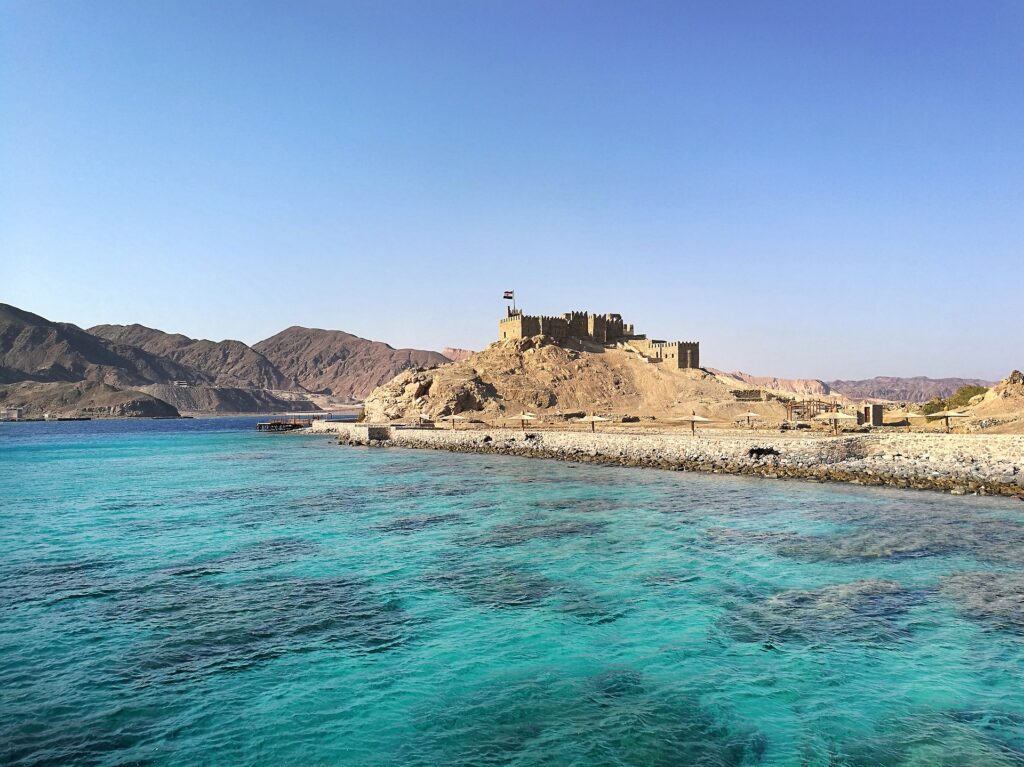Visitors from Russia and Ukraine have been a vital part of Egypt’s tourism sector. According to the Ministry of Tourism and the Egyptian Chamber of Tourist Establishments, they typically account for about 40% of vacationers at the Red Sea and Mediterranean beach resorts. Combined, they accounted for nearly 1.9 million in 2021, according to government data.
When Russia invaded Ukraine in late February, it appeared as if the war might jeopardize tourism. Workers at Red Sea resorts reported hotel occupancy dropped 35%-40%, according to Mohamed Sabry, a writer for Al-Monitor, a Middle East news website. The week following the invasion, Ahram Online’s Safeya Mounir described the war as “another heavy blow” to Egypt’s tourism sector.
The UN World Tourism Organization (UNWTO) said the fallout from the conflict would threaten tourism-related jobs, increase travel costs, and put pressure on businesses due to higher oil prices.
However, there were signs of recovery by May as Egypt sought ways to compensate for lost tourism revenue. UNWTO member Said Al-Batouty said Egypt expects 7.5 million tourists this year, with the number of German visitors increasing 30% compared to 2021 to help offset the decline in Ukrainian and Russian visitors.

As Egypt tries to fill gaps caused by the lost revenues due to the war, rising inflation worldwide presents an opportunity for the country to promote itself as an affordable alternative for tourists. The Central Bank devalued the pound in 2022 by around 20.7%. Challenges, however, include Europe’s cost of living crisis and short-staffed airports.
Government push
Egypt is a standout tourist destination in the region, offering almost all leisure activities and services except skiing. According to the World Economic Forum’s Travel and Tourism Development Index, published in May, Egypt ranked first in Africa, fifth in MENA and 51st globally in terms of the number of visiting tourists by the end of 2021.
However, the government is aiming for more. In February, USAID and the Ministry of Tourism and Antiquities launched the Esna Tourism Promotion Campaign in Luxor to restore historic landmarks and improve historic infrastructure in the city. The campaign will also organize “exhibitions, photography competitions, and folkloric events to highlight Esna’s attractions, its readiness to host expanded tourism, and opportunities for potential further investment,” reported the U.S. Embassy in Egypt.
In June, Al Ahram reported that the Ministry of Tourism would send a revised draft of the Egyptian tourism promotion strategy, first announced in April 2021, to the contracted international consultants.
Looking ahead, the government will likely capitalize on upcoming mega-international events, including the Nov. 27 Conference of the Parties, to focus on eco-tourism. Meanwhile, the officially-unopened Grand Egyptian Museum will revolve around how easy tourists can see Egypt’s pharaonic history in one place. The government is promising to hold an international inauguration ceremony to eclipse that of the National Museum of Egyptian Civilization, where over 35,000 guests attended the inauguration festivity and saw a convoy of 22 mummies moved live to the new facility.

Courting the world
Egypt has actively marketed itself abroad as a tourist destination through discussions with other officials and ad campaigns. On his visit to Rome in July, Minister of Tourism and Antiquities Khaled El-Enany met with Ivana Jelinic, president of the Italian Federation of Tourism and Transportation Associations. Spurred by what the Daily News Egypt called a “remarkable increase in the tourist movement coming to Egypt from Italy,” El-Enany and Jelinic discussed scheduling introductory visits for Italian tour operators and joint advertising campaigns.
Ad campaigns will not be limited to just Italy. Later that month, the ministry announced the beginning of its campaign in New York’s Times Square, which draws 80 million visitors a year. The campaign photos and videos of attractions were done by the Egyptian General Authority for Tourism Activation and are scheduled to run for an entire year. It is “an invitation to the American people and to all visitors who flock to Times Square to visit Egypt and enjoy its touristic and historical monuments,” said Amr El-Kady, CEO of the authority.
In addition, Egypt has been trying to attract tourists from Israel. In April, EgyptAir began twice-weekly direct flights between Tel Aviv and Sharm El-Sheikh, according to the Israeli prime minister’s office. The Israeli Embassy in Egypt reported more than 700,000 Israeli tourists visited in 2019. Realizing there is a strong base, the government added other facilitations in Sinai’s resorts that they frequent. One is a 36-kilometer (22-mile) wall around the tourist section of Sharm El-Sheikh. “[These moves have] considerable potential to revitalize Israeli tourism to Sharm El-Sheikh and will help Egypt overcome some of the effects of the Russian war in Ukraine,” Paul Rivlin, a visiting professor of economics in the Middle East at Emory University, told Al-Monitor in April.
While Egypt-Israel relations might be warming, the expansion of flights was met with resistance by the Boycott, Divestment, Sanctions movement that advocates for the rights of Palestinians. The group called for the boycott of two Sinai music festivals organized by Israeli companies in April and pressured the host hotels, which canceled the events.
Regardless, tourism experts who spoke to Al-Monitor said that while more flights between Tel Aviv and Sharm El-Sheikh might “increase the number of tourists coming to Egypt, it will not be enough to compensate for the accumulated losses the tourism sector has incurred over the years.”
Instead, Egypt tourism authorities have actively courted Russia. In June, El-Enany met with Russian Federal Agency for Tourism President Zarina Doguzova because “Egypt is one of the most preferred tourist destinations for Russians,” Doguzova said on her Telegram channel, a version of WhatsApp used to broadcast messages to large audiences.
By autumn, she said, there should be more flights between the countries and the ability to pay with Mir cards at Egyptian resorts. Mir is a credit card that is part of Russia’s National Payment Card System and owned by the Central Bank, according to Fortune Magazine’s Will Daniel. When the war started, Russians were blocked from using Western credit cards (Visa, Mastercard, American Express) abroad. As of April, there were more than 100 million Mir cards issued, according to Daniel, and “with U.S. card companies leaving Russia, Mir can more easily grow its market share.”

Up in the air
With COVID-19 travel restrictions in Europe lifted in February, Forbes magazine’s Alex Ledsom described Europeans’ desire to travel as “the sense of wanderlust that has been building over the course of the pandemic” as a form of “revenge travel.” Statistics provider Eurostat reported commercial flights increased by 156% in March compared to March 2021. Al-Batouty predicted that with the return of confidence after the COVID-19 pandemic, “the intra-European market is expected to benefit, driven by preferences for short-distance travel.”
However, scenes in European airports this summer might tell a different story. Ted Reed of Forbes described airports as “choke points for the sudden upturn in post-pandemic travel, which has overwhelmed sectors of the air travel infrastructure.” He said crucial airports such as London’s Heathrow and Amsterdam’s Schiphol were overwhelmed. Eddy Pieniazek of London-based Ishka, a global information and advisory business, said airports faced “shortages in terms of security staff and baggage handling mainly, also some check-in staff and other ground support workers.” These problems resulted in “long security lines, lost luggage and lengthy departure delays,” Reed wrote.
In a report, travel booking site Hopper said that “Brussels, Frankfurt and Eindhoven [in The Netherlands] airports have reported the worst on-time performance of major European airports.” However, Bergamo (Milan), Dublin and Madrid’s airports did not face “significant disruption,” with less than 20% of flights delayed and 2% canceled.
The effects of the mess in Europe were felt elsewhere. Egypt-bound travelers coming from or through Europe reported a lot of difficulty on the “Nomads” Facebook page. The group was flooded with complaints about lost luggage and long queues.
As a result, Europeans face difficulties making their way to Egypt. One woman from Bristol told the BBC she was “heartbroken” that her trip to Sharm El-Sheikh to celebrate her daughter’s seventh birthday was canceled. Rachel Honey-Jones said Bristol Airport was in absolute chaos. Despite constantly checking the status of her flight, she only received a cancellation email two hours before the family’s scheduled departure.
Airports’ attempts to solve the issue by cutting flights and imposing passenger limits haven’t been welcomed by airlines. When Heathrow announced on Jul. 12 that it would cap the number of passengers at 100,000 per day until September, U.A.E.-based Emirates airlines called it “unreasonable and unacceptable” and refused to comply. “Now faced with an ‘airmageddon’ situation due to their incompetence and non-action, they are pushing the entire burden – of costs and the scramble to sort the mess – to airlines and travelers,” Emirates said.
The next day, however, Emirates released a joint statement with Heathrow saying the airline would comply and was “willing to work with the airport to remediate the situation over the next two weeks.” However, U.A.E.-based carrier Etihad told Reuters it would operate its five daily flights at total capacity regardless of Heathrow’s request. EgyptAir canceled its Jul. 14 flights to Heathrow but did not comment on any other Heathrow-bound flights.
The appetite for travel might be back, but travelers face difficult circumstances. In addition to airport upheaval, Europeans must deal with “the rising cost of living and the war in Ukraine,” said Al-Batouty. According to Eurostat, inflation across the Eurozone reached 8.6% in June, up from 5.1% in January. The European Commission predicts that the EU will end the year with 7.6% inflation. That figure would then recede in 2023 to 4.6%. However, those rates are much higher than the European Central Bank’s target of 2%.
While Egypt hasn’t capitalized on tourism revenue this summer, it has a second chance during autumn and winter, usually a high season for tourists who fancy warmer winters. Heathrow expects to lift its passenger cap by Sept. 11. In addition to Doguzova’s proposed plan to allow Mir card payments and increase direct flights by autumn, Egypt’s promotional blitz might show results.







